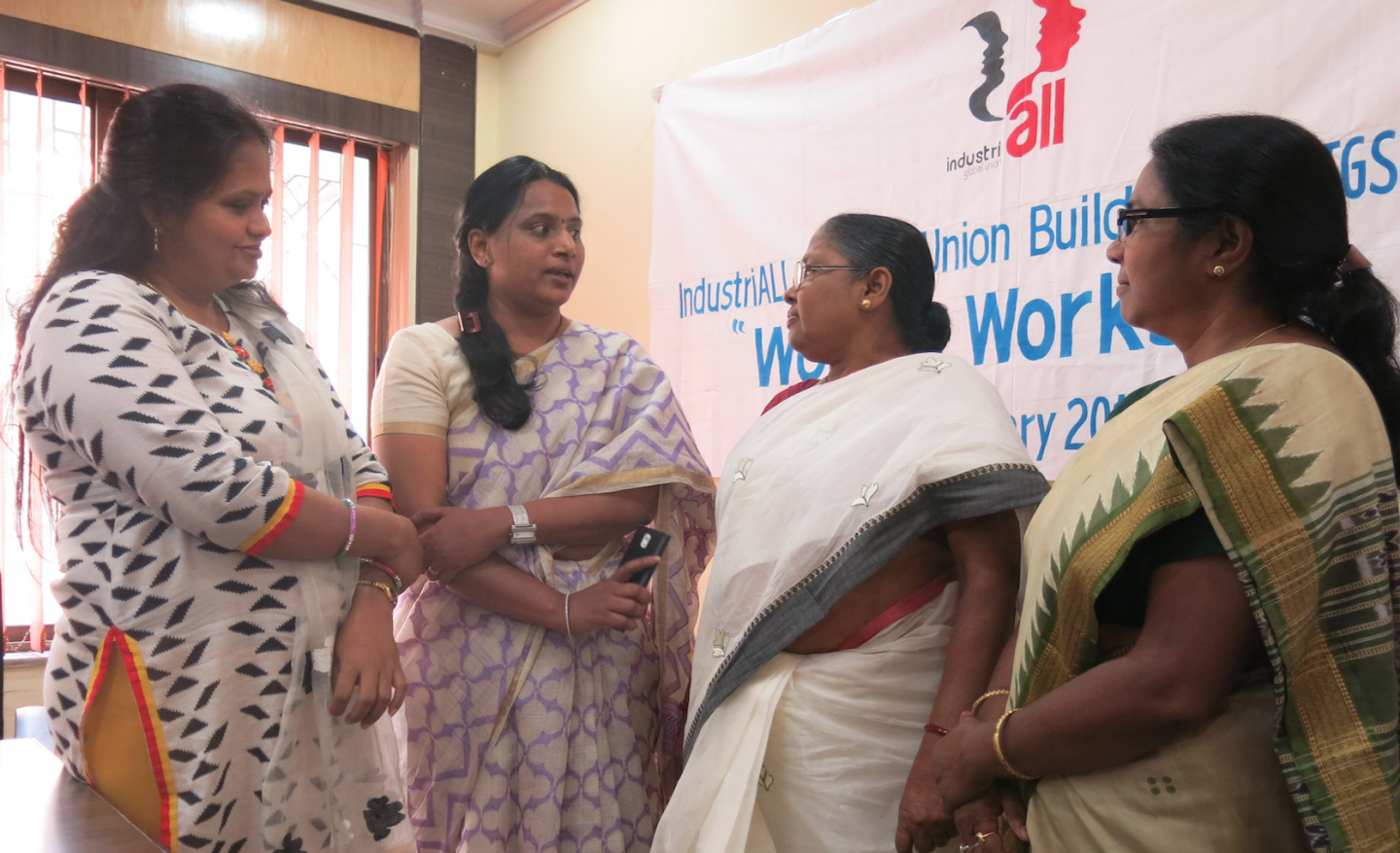Read this article in:
English
24 March, 2015On 25 and 26 February 2015, some 25 women leaders from IndustriALL Global Union Indian affiliates met in Kolkata, India for training in leadership and methodology.
After introductions the women used body mapping to identify where they experience pains both from working and looking after families. Among other things women suffer from migraines, headaches due to stress and head loads, shoulder pains from working long hours, elbow pains from cooking and sweeping, pains in the wrists, fingers and joints, knees, ankles and back. Women have poor digestion due to irregular eating and missing meals and urinary infections due to unhygienic toilets. Most women are anaemic because they do not have a proper diet. The spine has to carry heavy loads and bear the burden of housework. Most pains are physical as well as mental stress and strain.
When the women analyzed their workplaces, they realized that many of them do not have suitable toilet facilities. In public companies, for example the steel industry, the toilets were suitable and ventilation and lighting were adequate. On the other hand the other factories did not have toilets for women, the women had to sit on the floor, and workers had to eat their lunch at their places. In the steel industry only men are managers. Permanent workers get a bonus, whereas precarious workers do not even receive 500 rupees. The labour inspectors are bribed to keep them from visiting the factories.
The women from the shipbuilding union in Kolkata explained that previously their situation was miserable, but now since the union intervened it is far better. In the meantime they have central air conditioning, separate kitchen and toilets and restrooms. The keys are kept by the women. Uniforms, safety equipment and safety shoes are of better quality since the union intervened. Since then also they have a separate casualty room for men and women, whereas before the men and women were obliged to rest in the same room. They have a working sexual harassment committee that used to be controlled by management.
One woman from the textile mill explained that the dust is heavy in the weaving operation. Women have no personal protective equipment and no gloves. The toilet is outside. They have no suitable rest area. Their food gets spoiled. The vending area near the factory is unhygienic. The union is fighting for contract workers’ minimum wages. All women are on contract. Cotton and ginning is seasonal work. That is why it is tough to unionize the cotton and ginning workers.
Women from IndustriALL affiliate, the Self Employed Women's Association (SEWA), finish jeans in Gujarat. They do finishing, ironing and packaging. The work is divided into three parts. The women cut the threads. They must stand all day. The roof is made of zinc with poor wiring. The women earn 100 rupees (US$1.6) for eight to nine hours of work. They have no other choice for employment.
Ramuben from SEWA told us that after joining SEWA she gained confidence. “I used to be in purdah, but being in SEWA has helped me and other women be involved.”
The women also work in recycling, sometimes in the downstream of shipbreaking. They remove the plastic parts to be melted down. They have no safety equipment, no medical facilities. Their saris sometimes get caught in the work processes. Sometimes they lose fingers. The fumes are sometimes unbearable. They have no unionization, no safety. The machines are operated by men, but the women earn more.
The women did a role play which made a certain number of issues clear to them, such as the importance of women’s studies and the role that women and men play in families.
Women and their studies is a hot issue for the time being in India. With the role play the women had to negotiate, but still the father had the last word. The mother is a compromising member of the family and the one who makes sacrifices.
IndustriALL India has a women’s committee. The office is trying to create structures in South Asia. In addition every state should have a coordinator. These initiatives need to be institutionalized, otherwise they are up to leaders’ whims and charity. One of the goals is for the women workers to be leaders. The women at the workshop listened to a session by Asha Sehgal on leadership and concluded that they were all leaders.
The many projects that are going on in South Asia need to have reserved parts for women. The women discussed the planned booklet that will be used for training and propaganda purposes. The content of the booklet needs to be among other things: gender and gender bias, women’s safety and health, sexual harassment, toilets, personal protective equipment for women.
At the workshop the women learned how important it is to have a women’s committee and to develop women’s leadership.
The women created a what’s app group to keep contact.


